
- Types Of RVs
- Tow Vehicles
- Maintenance & Repairs
- RV Power & Electrical Supplies
- RV Appliances
- Living In An RV
- Travel & Destinations
- RV Gear Buyer’s Guides
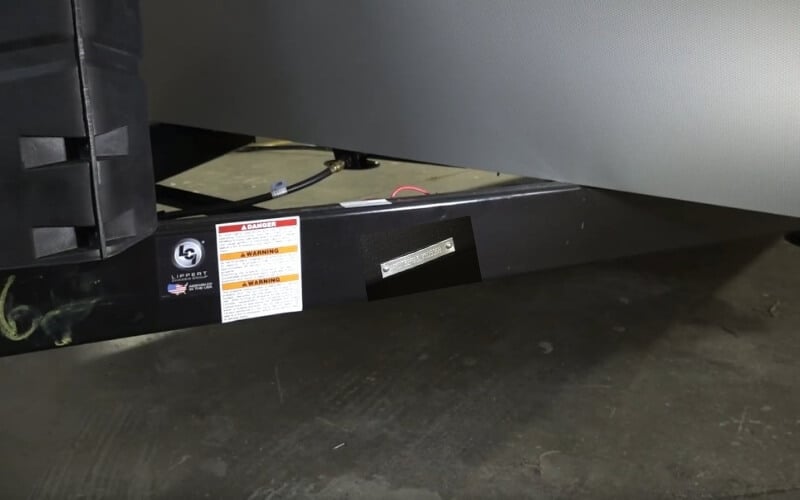

How Do I Check A VIN Number On A Travel Trailer?
- Last Updated: September 17, 2024
- 16 minutes read
If you have ever bought a new car, you probably checked the VIN record to get a basic history of the vehicle.
This is a very important step since a vehicle’s damage and accident history may impact it’s safety or future maintenance. You also want to make sure you’re not buying a stolen vehicle.
Can you get the same history for a travel trailer? Do travel trailers even have VINs?
Just like normal cars, travel trailers and RVs have a VIN that you can use to get a basic history of the camper, including insurance claims about damage, theft, or accidents. The VIN for a travel trailer is the same as for a car; a unique number specific to that travel trailer or RV.
In this article, I’m going to cover what a VIN is and what information you can get when looking up a VIN, as well as how to find and look up the VIN for your travel trailer.
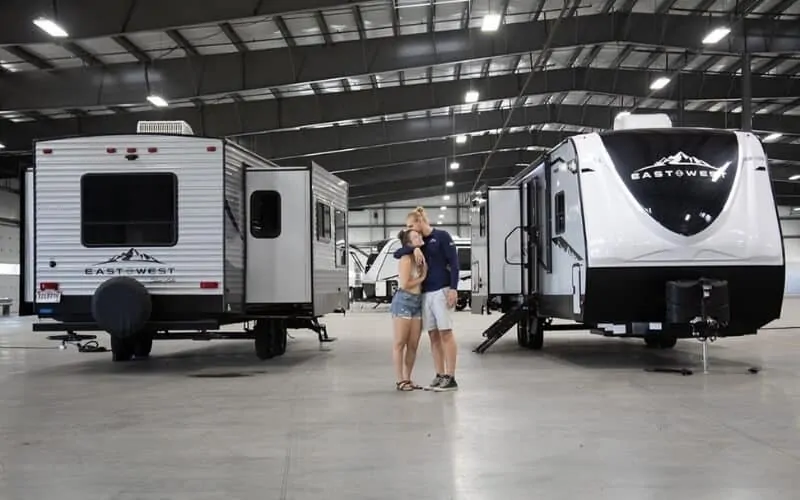
IN THIS ARTICLE
Understanding Your RV’s Vehicle Identification Number
All street-legal vehicles, including cars, motorcycles and travel trailers, are required by law to have a VIN (Vehicle Identification Number).
Every road vehicle that was made after 1977 has one. Also, VIN numbers were not standardized before 1981, so if your travel trailer was made in 1980 or earlier, it might not have a VIN.
The National Highway Traffic and Safety Administration (NHTSA) defines the VIN format for all classes of vehicles.
These numbers are 17 alphanumeric characters long and therefore, they include a mix of numbers and letters.
The VIN is essential for identifying one trailer from another and has six different parts:
- 1: World Manufacturer Index (WMI): Where the vehicle was built (first character) and the manufacturer (second and third characters).
- 2: Manufacturer Specification Data: The trailer’s model series, engine (if applicable) and body type (fourth through eighth characters)
- 3: Check Digit: U.S. Department of Transportation authenticity digit that verifies the VIN (ninth character).
- 4: Model Year: Model year of the camper (tenth character).
- 5: Plant Location: Where the vehicle was built or assembled (eleventh character).
- 6: Vehicle Unique Number: The last six characters make up the vehicle’s serial number.
Are The VIN And Serial Number The Same Thing?
No. As noted above, the serial number is a part of the VIN (the last six characters), but the full VIN is the unique number assigned to that particular travel trailer. The serial number is not as unique.
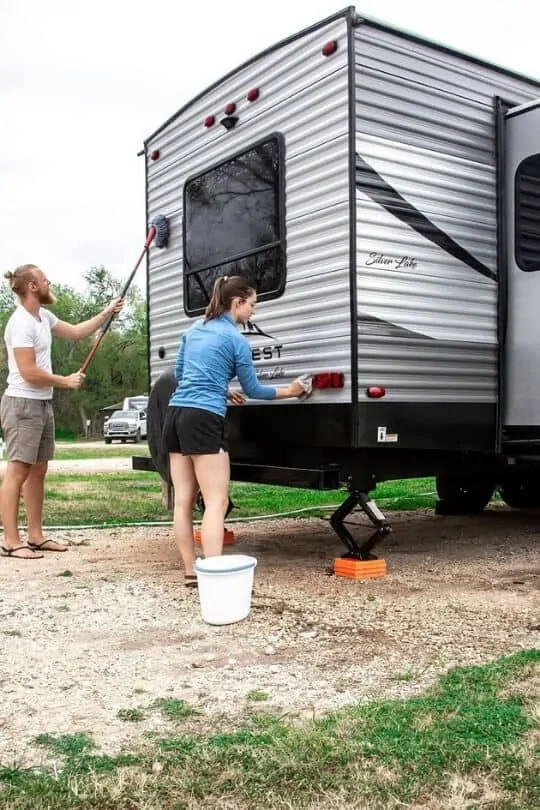
How Do I Find Out The Year Of My Travel Trailer?
We discussed above that the tenth alphanumeric character in your travel trailer’s VIN signifies the model year of your trailer.
However, it’s not so simple since it’s only one character. Plus, it can be a letter.
Refer to the chart below to find out what letter or number your VIN should have based on the year it was made.
Note that there are some alphabetical letters missing – this is probably due to their visual similarity with numbers (“I looks like the number 1, and “O” and “Q” look like zeros, which are also excluded).
As you can see for trailers that were manufactured in the 1980s and with campers made between 2010 and now, there is an overlap.
However, there is a 30-year difference, so it should be obvious that your trailer was built in 2018 instead of 1988, for example.
How Do I Get A VIN Number For My Vintage Travel Trailer?
If the travel trailer or RV you’re buying is a vintage model and was manufactured before 1981, it might not have a VIN, or the wear-and-tear over the years may have worn down the sticker so that it is illegible.
If the seller or dealer doesn’t have documentation (such as the title) with the VIN on it, they may need to apply with your state’s DMV to have a new VIN issued.
If you already own the trailer, this application would be your responsibility.
The process to get a new VIN issued will depend on your state, so you should start by checking with a local DMV office to find out what that process is.
Generally, you will need to complete and file an application for a new VIN, prove your ownership of the trailer (i.e. a bill of sale), and have any state-required inspections or tests completed.

What Does A RV VIN Check Show?
It’s always important to check the record for a travel trailer’s VIN before you buy it, even if you’re buying from a dealer.
The vehicle history report will show you key information that may impact the trailer’s safety, maintenance, or even its value.
When you get your VIN report, look for key, camper-related vehicle activity like:
- Collisions and accidents are one of the most important things to look for when you run a VIN check. Insurance companies and police stations report accidents and the VIN numbers of the vehicles involved, so the trailer’s history report will reflect what it’s been through. Minor accidents aren’t too big of a deal, but you’ll probably want to avoid campers that have sustained serious frame or structural damage or RVs where the airbags have been deployed.
- Airbag safety is another thing to look at if you’re buying an RV with airbags, since airbags are commonly recalled and defective ones can be incredibly dangerous if deployed in a crash. By checking the trailer’s VIN, you can find out if the airbags have been recalled and if they have, your dealership should replace them for free.
- Service and repair information is also listed on a vehicle history report. Although not all services are recorded, most major ones are. If your trailer was ever flooded, a VIN check will let you know – be wary of buying any vehicle that was flooded.
- Odometer rollbacks are something to look for when buying an RV. If the reading from the VIN check is higher than the reading on your RV’s odometer, it could mean the odometer was rolled back and it may be unreliable.
- Recall details may not be relevant for most campers, but you should check the vehicle history report just in case. If there are recalls, check to make sure they have been repaired or replaced before you buy.
- Title information is another thing to look out for. If the title is listed as salvaged, it means that the trailer was in an accident and the insurance company declared it a total loss. Someone would have repaired the trailer and acquired a salvage title to register the trailer. If the title is junked, the trailer is legally unsafe to drive on U.S. roads.
How To Find Your Trailer’s VIN Number
Although every travel trailer and RV is assigned a VIN at the point of manufacture, it’s labeled in different places on different campers and there’s no standard location.
Generally speaking, the VIN for a travel trailer on the camper’s trailer tongue, frame rail near the hitch, or on the Federal certification label.
The government requires a trailer to have a Federal certification label to show that the trailer complies with motor vehicle standards, and shows the manufacturer’s same, the trailer’s VIN, and other information such as weight ratings and cold tire inflation pressures.
The VIN is usually on a sticker and some typical places to find it on an RV trailer are:
- Steering column
- Vehicle firewall
- Radiator support bracket
- Driver’s door frame
- Inside wheel arch
- Machined pad on front of engine
- Front left corner near the bottom of the sidewall
How To Check A Trailer VIN Number
You should always verify that the VIN on the trailer’s title matches the VIN on the actual vehicle before buying it. Follow these steps to find it.
- Step 1: Park the trailer in an open area where you’ll be able to see every part of the camper, from numerous angles. You may need a flashlight, since the VIN could be located on the underside of the trailer.
- Step 2: The trailer tongue at the front of the trailer is a common location for the VIN sticker. Look at the metal bars that attach to your towing vehicle’s trailer hitch.
- Step 3: Another common place for the VIN sticker is the thick, heavy bars that frame the base of the trailer. Walk around the trailer and check the sides and undersides of each frame bar, and check the front and rear bumpers as well.
- Step 4: If you still haven’t found the VIN, it’s time to look inside. You might find the VIN on or near the control panel that directs the trailer’s interior systems, or in the door frame.
- Step 5: Write down the 17-digit VIN once you find it, and consider noting where it’s located so that you don’t have to hunt for it in the future.
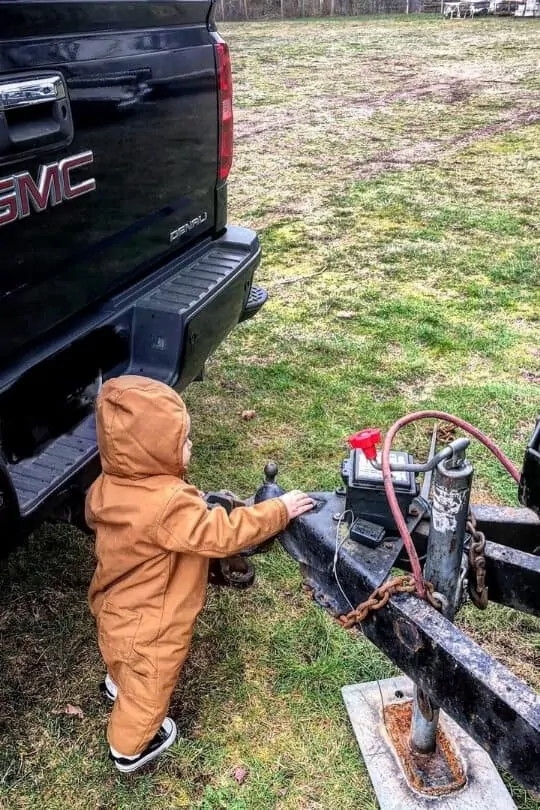
RVs Might Have Multiple VINs
If you’re searching for the VIN on your RV, be careful because many RVs have two VINs.
This is because most RV manufacturers build their campers on chassis that were manufactured by a third party (who assigned a VIN to the incomplete vehicle), then the RV manufacturer incorporates the RV into the incomplete chassis and assigns a VIN to the completed camper.
So, Forest River might buy a chassis from Chevy or Ford to build their motorhomes, and the motorhome will have a VIN from Forest River as well as from Chevy or Ford.
How To Get A Report For Your Trailer’s VIN
After locating the VIN on the trailer, there are two ways to get a vehicle history report for it.
There are several online VIN check services, but they often don’t have reports for travel trailers. Your best bet is one of the following:
- Department of Motor Vehicles (DMV): Call a local DMV office and provide them with the VIN to request a report. Some states offer this service online as well, and may require a small fee for the full report.
- Dealership: Contact a dealership that is operated by the trailer’s manufacturer. The type of report and amount of information you can get may vary, but the dealership should be able to help you contact the appropriate department at the manufacturer for the information you need.
How To Keep Accurate Records For Your Travel Trailer
When you own a travel trailer or RV, you should keep records for future owners and your own organization.
This will help with resale value as well as trust with potential buyers down the road; if you have accurate and specific information about what’s happened to the camper throughout its life, they’ll be more confident buying it.
What kinds of records should you keep? Here’s my take:
- 1: Keep all documents from your purchase . File the title, owner’s manual and any other records from when you bought the trailer, especially the bill of sale.
- 2 : Report and document any damage . It’s important to keep a record of things that happen to the trailer, such as accidents or damage like fires, flooding, or even structural damage (such as if a tree fell on your camper).
- 3: Report even minor accidents to the police . Even if the damage was unsubstantial and you won’t press charges, filing a police report will ensure the damage will be reflected on the trailer’s VIN, and helps your state keep accurate records of the camper’s condition.
- 4: Record any sales, loans or thefts involving the trailer . Always report any thefts or burglaries to the police, of course. You should also keep a file of any loans against the camper and retain a copy of the bill of sale, if you sell it. You wouldn’t want to be held responsible for something that happened to or with the trailer after you’ve sold it! Be sure to follow the correct legal channels whenever your trailer changes hands, and verify that the new owner updates the registration under their name.
- 5: Keep record of any upgrades or maintenance . While insurance companies and local police are certain to keep records of any accidents or damage involving your trailer, the only entity responsible for keeping track of major services or upgrades is you. Try to also keep a schedule or record of any professional cleaning services you have done, since this tells future buyers that you’ve kept the camper in good shape. Plus, upgrades and modifications you’ve made can help increase the resale value if you have a record of them.
Summary About Looking Up A Travel Trailer’s VIN
I hope this article has helped you with the information you need to find a travel trailer or RV’s VIN without too much hunting! It helps that campers have VINs just like any other road vehicle, and that they are constructed the same.
Remember, it’s very important to check the VIN of a camper before you buy it, since the report can give you vital information that the previous owner might not know or tell.
Once you own a camper, it’s also important to keep accurate records for your own peace of mind as well as to facilitate an easier re-sale if you decide to get rid of the camper down the road.
How can I perform an RV VIN lookup?
You can perform a RV VIN lookup online using various websites that offer this service, such as RVchecks.com or RVfax.com. You must enter the RV’s VIN and pay a fee to get a full report.
What is the process for a camper VIN lookup?
A camper VIN lookup is a way to check the history and details of a camper vehicle using its unique identification number. A camper VIN lookup can reveal information such as the camper’s manufacturer, model, year, features, and accident or damage records.
To perform a camper VIN lookup, one can use online services that offer free or paid reports or contact the camper dealer or manufacturer directly.
How can I use an RV VIN lookup to get NADA values?
NADA stands for National Automobile Dealers Association, and it provides guides for pricing different types of vehicles. To use an RV VIN lookup, enter the 17-digit Vehicle Identification Number (VIN) of the RV you are interested in. The VIN is a unique code that identifies the vehicle’s make, model, year, and other features.
The RV VIN lookup will then show you the NADA values for the RV based on its condition, mileage, and optional equipment. You can use these values to compare different RVs and negotiate a fair price.
What information can I obtain using an RV VIN decoder?
An RV VIN decoder is a tool that can help you learn more about your recreational vehicle. By entering your RV’s 17-digit Vehicle Identification Number (VIN), you can get information such as the manufacturer, model, year, engine type, weight, and more.
This can be useful for verifying the features and specifications of your RV, as well as checking its history and safety records.
How can I perform a travel trailer VIN lookup?
A travel trailer VIN lookup can be done online using various websites that offer this service or by contacting the trailer’s manufacturer or dealer. A travel trailer VIN lookup can help you verify the trailer’s history, ownership, condition, and value.
Is there a way to perform a free camper VIN number
There are different ways to perform a free camper VIN lookup. One option is to use the NICB’s free VINCheck service, which can help you determine if the camper has been reported as stolen or salvaged by cooperating insurance companies2. You can access this service here: https://www.nicb.org/vincheck
Another option is to check with your local DMV or visit them in person. You may need to provide personal information and pay a fee for this service2.
A third option is to use some online tools that are NMVTIS-approved providers of vehicle history reports. NMVTIS stands for National Motor Vehicle Title Information System, a program that protects consumers from fraud and unsafe vehicles.
About Author / Aaron Richardson
Aaron Richardson is an expert RVer and the co-founder of RVing Know How. Aaron, along with his wife Evelyn, has been living and traveling in their Keystone Fuzion RV since 2017. Their adventures span across the country and beyond, including memorable RVing experiences in Mexico. Aaron's passion for the outdoors and RVing shines through in his writings, where he shares a blend of travel stories, practical tips, and insights to enhance the RV lifestyle.

Is there a Kelley Blue Book for RVs and trailers?
How much propane does an rv furnace use.
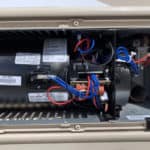
Leave a Comment Cancel reply
Your email address will not be published.
Save my name, email, and website in this browser for the next time I comment.
You Might Also Like

9 Reasons Why “Overlanding” Is Booming In Popularity Than Ever

The Top RV Roof Sealants for Long-Lasting Protection

How To Remove RV Light Covers (Interior & Exterior)
Start typing and press Enter to search
- Trailer & Camper
Trailer & Camper VIN Lookup
Try our Trailer VIN Lookup for a Detailed Specification and History Report
Campers have VIN numbers as they are a type of recreation vehicle. The VIN contains specific details about the camper such as make, model, & year. As it’s registered with the DMV , you can receive detailed reports about the camper’s accident history , title record, theft record, and more details.
What is Trailer VIN Lookup
Trailer VIN Lookup is a tool designed to decipher the unique 17-character VIN of the trailer as it’s difficult to tell what it means without referencing charts. This tool will automatically determine the make, model, year, and other important details.
The camper VIN lookup tool may also have access to other databases from vehicle registries, traffic authorities, law enforcement bodies, and manufacturers. This allows it to pull additional data that you can’t get by decoding the VIN such as any open recalls or safety issues. It may check for reported accidents, theft reports , or the trailer’s service record.
How Important is it to Check a Camper Before Buying?
A camper is not a cheap purchase. That means that you should consider everything from the level of wear on the camper’s interior to its past history that could reveal hidden details that you may not spot during the visual and mechanical inspection.
VIN and history check for campers will be instrumental for the following reasons:
- Revealing prior accidents or serious damage Trailers may have sustained damages in the past from accidents or natural disasters. Knowing the type of damage can help you determine if repairs were performed professionally and won’t be a bother in the future. Accident reports can tell you about the area of impact or if the accident was quite severe to the point of interfering with the chassis. Insurance companies may have also deemed the trailer as salvage meaning that the repairs were more expensive than the value of the unit . Overall, getting this information ensures that you can better assess the trailer for safety and reliability.
- Finding out about manufacturer recalls Travel trailers and fifth wheels are certainly more complicated than ordinary vehicles as they need to be safe on the highway and safe to live in. Recalls may touch on far more items. They could touch on a safety issue like an LP gas leak or a mechanical defect that may pose danger to the trailer’s handling and stability. After knowing of past recalls, you should check if issues have been rectified. Note that even newer models may have outstanding recalls.
- Checking for junk or salvage records A camper may have a salvaged title if it was declared a total loss after being severely damaged due to a wide variety of causes, such as road accidents, floods, fires, etc. Salvage-title campers may undergo extensive restoration but even then, they are still worth less than campers with clean titles. They may also have higher insurance costs. You should find out why the camper was salvaged and if the extent of the restoration was sufficient. Junk titles indicate that the inspector deemed that the camper should never be rebuilt. It’s better to steer away from trailers with junk titles as they should have already been scrapped.
- Checking for past theft records Camper trailers are an easy target for thieves. That makes it paramount to know perform a trailer serial number lookup to check for any theft record and to authenticate that the VIN is legitimate. If the trailer was stolen and recovered, it is important to know the condition it was recovered and what repairs were needed. Additionally, stolen trailers will have their titles branded by the insurance company, and this could affect the premiums you pay. So, even if nothing else was taken, the theft affects the value and you should always negotiate for a better price.
- Checking for outstanding liens Finding out about lien and impound records helps you ascertain that all outstanding debts owed on the trailer have been paid off. Many buyers only find out about outstanding liens after the transfer fails to go through. They are left having to part with more money to execute the transfer. Additionally, determining if the trailer was ever impounded is essential to ensure that you’ll not be liable for any fines or other fees.
- Figuring out the level of use Low mileage cars are highly desirable as they have seen much less use. With other vehicles, you can see odometer readings when the registration was transferred or renewed. But camper trailers typically do not have odometer records. This can make it difficult to determine the level of use. Still, you can get access to the title history to figure out how many people previously owned the camper trailer. If it has been through multiple owners, it may have more wear and tear than a trailer that has only had one owner. Previous ownership records can shed light on issues that may have occurred due to the usage or age of the camper trailer.
Campers Value

A full report may include a recommended cost for a trailer . The price is a reference value based on what similar units have sold for in the market. You may also see previous sale records and how much the trailer sold for. The price recommendations give you a baseline when negotiating. And the extra details will make you feel more confident and empowered.
Free Trailer VIN Check - is it Possible?
Yes, it is possible, but the data might be very fragmentary and without guarantees of completeness.
For instance, with the free check, the FAXVIN lookup tool will only determine the technical specs from the VIN. This check does offer a history report showing prior services, registrations, accidents, or damages.
The full report on our website includes the maximum number of sources of information: dealers, maintenance services, state DMVs, police reports, etc.
You’ll have the chance to access the following categories of information:
- Title records with ownership changes in chronological order;
- Sale records & listing prices;
- Junk, salvage, & insurance records;
- Salvage auction records;
- Theft records;
- Lien, impound, & export records.
The system provides a preview of categories with available information. For instance, you may see that the final trailer VIN check report will have the odometer history. This ensures that you will always get the most value. And if you’re assessing multiple vehicles during the purchase process, FAXVIN has discounted packages for more checks.
Where Can I Find the VIN of a Trailer?
The VIN of your trailer or camper is usually etched on the main components of the trailer that are hard to replace or damage. You can typically expect to find the VIN in the following areas:
- On the tongue;
- Near the axle;
- Inside of the doorframe;
- Inside the closet;
- Under the propane tanks;
- Under the front or rear end of the trailer;
- On the entry screen door;
- Under the sink;
- In an outside storage compartment;
- Inside a wheel well.
It's always crucial to check that the VIN number matches what's stated on its registration and insurance documents. Fraudsters may forge the VIN in order to conceal the vehicle's past.
How to Get a Trailer Report?
Our VIN checker tool is easy to use and consistently updated, giving you the most up-to-date information. In just 4 simple steps, you can know as much as you need about the vehicle before making a purchase:
- Locate the Instant VIN Check section at the top of this page. Enter the number into the specified field and click on 'Check VIN'.
- The tool deciphers and presents the car specifications from VIN.
- Click 'Continue' if you want a more comprehensive history report. Choose from the provided packages and provide your payment details.
- Wait for the system to pull and display the relevant information. You’ll have a full history report on the camper van within a few minutes.
You now have the opportunity to access a detailed camper VIN check report from reliable data sources with information on damages, accidents, mileage rollbacks , repossession and lien records, and other potential defects.
Don't miss out on this incredible chance to confirm the trailer’s condition.
Before purchasing any camper trailer, proper research is crucial to know all potential issues that may affect your next purchase. There are many details you can see after meeting the seller in person and examining the trailer.
But you should also supplement your research by performing a camper VIN lookup for detailed information about the camper trailer’s history. Performing this check can also mitigate any potential fraud and make the purchase much safer.
Frequently Asked Questions
Was this article helpful?
- Free VIN Check
- Best VIN Check Sites
- Best Vehicle History Report Sites
- Best VIN Decoders
- Best Motorcycle VIN Check
- Best ATV VIN Check
- Best RV VIN Check
- Best Truck VIN Check
- Best Trailer VIN Check
- carVertical
- CARFAX vs AutoCheck
- carVertical vs AutoCheck
- carVertical vs EpicVIN
- EpicVIN vs AutoCheck
- EpicVIN vs CARFAX
- carVertical vs CARFAX
- Mercedes Benz
- United Kingdom
- What is VIN?
- What Can You Tell From VIN?
- How to Find VIN on Car?
Where are VIN Numbers Located on a Trailer?
Trailers have a unique alpha-numeric 17-digit VIN that helps buyers and sellers make the right choice. Moreover, it also shares worthy data about your trailer that may help you use it to the fullest. But where is the VIN located on a vehicle? Let’s figure it out!
Key Takeaways
- The trailer’s VIN is present in different locations, including axles, doors, body, engine, storage area, etc.
- If your trailer doesn’t have a VIN or is faded, consult the state DMV to get a new one.
Where Can You Find the VIN on a Trailer?
The VIN is mainly located at the attachment point between the trailer and the vehicle. However, it keeps changing with the model of the trailer and manufacturer. Here are the different locations where you can find the Trailer’s VIN:
- Tongue: Look around the tongue of the trailer and the point of the hitch connection.
- Axles: If the VIN isn’t anywhere around the tongue, the next place to look for it is near the trailer’s axles. Search all the way from the front to the axle to the back, and don’t forget to look on the wheel guard underside of the trailer’s frame.
- Door: Another place to look for VIN is inside your trailer’s door or the doorframe.
In case you can’t find it there, the cabinets, storage box, engine, steering column, etc., are also many of the other places where the VIN may be located.
Can I Find the VIN of My Old Trailer?
If your trailer is very old and the VIN has either faded or didn’t come, you can find it by applying for it at the state’s DMV. The process and duration for the issue of your old trailer’s VIN vary depending on your state.
Lastly, trailers’ VIN is located at different places, but the most common ones are near the axles, on the door, tongue, cabinet, storage box, etc. You can also get a VIN for your old trailer with the help of your state DMV.

VIN Mentor is a place where everyone can find safe car-buying advice.

- Review Process
- Advertiser disclosure
- Terms of Use
- Privacy Policy

Where Is The VIN Number On A Camper: RV VIN Location
Home » Where Is The VIN Number On A Camper: RV VIN Location
- March 18, 2024
- Beginners , RV 101

Table of Contents
This post may contain affiliate links. Check out our disclosure for more information.
The RV VIN location on your camper is an important piece of information that is required for insurance purposes and also in buying and selling an RV. But, where is the VIN number on a camper? In this comprehensive guide, we’ll explore the significance of VIN numbers, where to find them on different types of RVs, and how to use the information it provides!
What is a VIN Number?
A Vehicle Identification Number (VIN) is a unique number that is an identifier for your RV. A VIN is like a finger print for your RV and is a 17-characted code. This 17 digit number is an alphanumeric sequence that contains vital information.
This sequence of letters and numbers is not random. Each portion of the VIN can be decoded in order to get specific information that pertains directly to your RV. The service history of your RV is tied to this VIN and can be searched in order to find historical data for your RV.
Do RV’s Have VIN Numbers?
Yes, all types of RVs, including towable recreational vehicles, have specific VINs. This identifying number must be applied to each RV, much like with cars. VINs can be located in various places on the RV, so it is essential to know where to find this important number.
The Department of Transportation (DOT) requires all vehicles travel trailers, RVs, and towable products over a certain weight to have a VIN decal. If you cannot locate the VIN on your RV, it is important to contact your local DMV to apply for a new one.
Where Are VINs Located on RVs?
Locating the VIN on your RV may vary depending on the type and age of the camper. Because of this, it is important to familiarize yourself with the different places manufacturers may put a VIN. Here are common locations:
Federal Certification Label
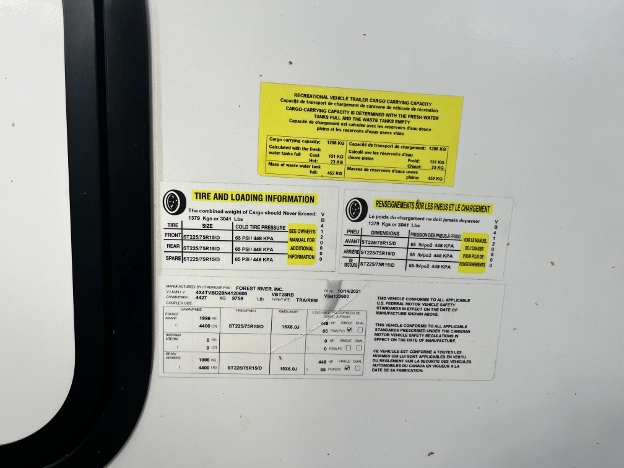
The Federal Certification Label is an information label (sometimes on a metal plate) that includes important manufacturer information and the VIN. This label can usually be found on the left front corner of the RV near the bottom of the sidewall. This VIN plate includes the VIN, Year, GVWR/GCWR, information about the tires, and other information. This information may also be found on a yellow sticker.

Cabinet Door or Entry Screen Door
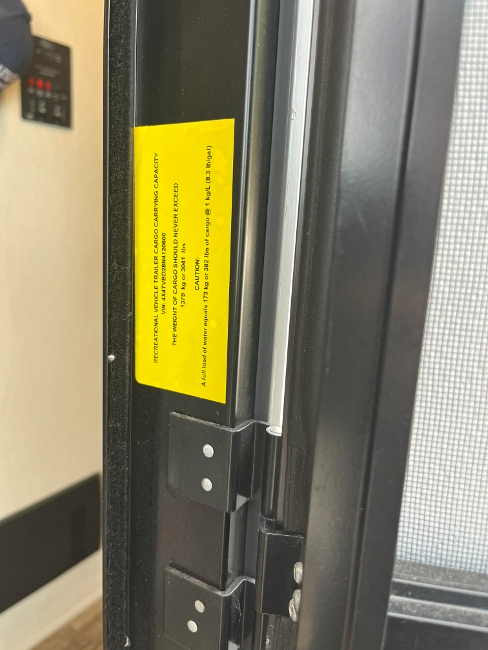
Some RVs may have a VIN sticker in utility cabinets, cupboards, or near the driver side entrance door. It is helpful to pay attention when opening these doors and compartments to familiarize yourself with any information that may be located there.
Trailer Tongue
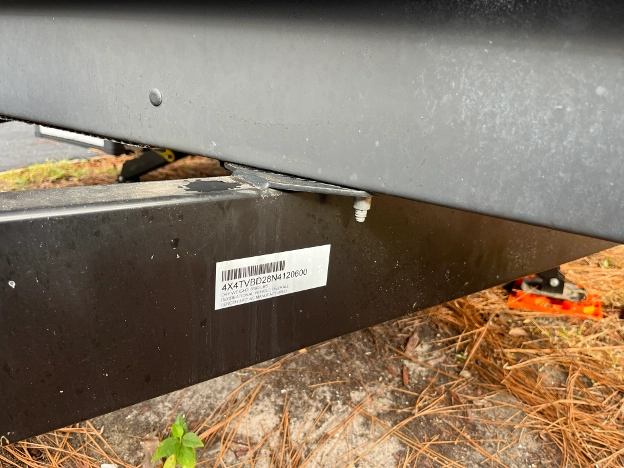
A popular location for the manufacturer’s VIN is often stamped on the trailer tongue. This can usually be located near the propane tanks (if present) near the tongue.
The frame rail is a common location for the RV’s VIN number. This may be either up front or along the rail down the side of the camper. It is important to note that frequent travel can reduce the readability of this VIN.
The RV chassis may have a separate VIN, so paying close attention is essential. The chassis may have had a separate VIN from the manufacturer before incorporating the RV. If you are referring to an RV Chassis VIN, double-check the VIN in a separate location to ensure they are the same number. If they are not, the RV VIN will apply to the RV instead of just the chassis.
The VIN will be attached to your insurance policy if the RV has already been insured. An insurance company requires an RV VIN to provide coverage.
Registration
The VIN will be located on the registration documents if the RV has already been registered after purchase. A travel trailer’s VIN is required to register the RV. When registered, RVs usually receive a DMV inspection (vin inspection), which will list the actual VIN.
Bill of Sale
The VIN will be located on the Bill of Sale if the RV has already been purchased. An RV VIN should have been provided by the previous owner and is required in the sale of an RV.
If the dealership still owns the title to the RV, they should provide the VIN to provide vehicle history reports. The dealership would need a VIN to list and sell the RV.
Finding out the Year of Your RV With the VIN
The 10th character in the VIN provides information about the model year of your travel trailer. This code is crucial for various purposes, including insurance, registration, and maintenance. Some informational tables can help you determine what your VIN means.
VIN on a Vintage Camper
Vintage campers that predate 1980 may not have a VIN. If this is your RV, then look for a serial number. A serial number is a unique identifier in older models without VINs.
Vintage campers can present a challenge when it comes to VINs. Always contact your local DMV for help. The DMV can assist you in obtaining the proper identification numbers for retro rigs.
VIN on a Pop-up Camper
Pop-up campers, like other RVs, have VIN numbers. These may be located on the frame, inside a cabinet, or entry screen door.
VIN on a Drivable RV
For drivable RVs, the VIN could be in various locations. In addition to some of the normal RV VIN locations, there are locations that are similar to cars. Important places to search for the VIN tag of a drivable RV are as follows:
- Front corner of the coach
- Steering column
- Vehicle firewall
- Radiator support bracket
- Driver’s door frame
- Wheel wells
- Machined on the front of the engine
How to Get a Replacement VIN for an Old RV?
If your old RV lacks a VIN or has a worn-out one, contact your state’s DMV for assistance. The process may involve fees and documentation to prove ownership. Navigating the DMV procedures for vintage campers ensures a smooth transition to compliant identification.
You should start the process of replacing the VIN as soon as you realize the need. This can take a little time, and it is best to get it out of the way before trying to squeeze it in on a time crunch.
Is the VIN the Same as the Serial Number?
The VIN and serial number are not the same. Each of these numbers are distinct and unique. The serial number is one piece of information in the VIN.
Vintage campers may not have a VIN and may rely solely on a serial number for legal identification. Understanding the differences and limitations is important so that you can ensure your RV is compliant, regardless of age.
How to Get an RV VIN Report?
Obtaining an RV VIN report is crucial for assessing its history. A few ways to get an in-depth vehicle history with a VIN exist. The main three ways are through the DMV, RV dealership, or online platforms.
VIN reports through RV dealerships are usually easy to obtain and should include important information when buying. RV dealerships generally provide these reports as a show of transparency.
Additionally, some online sites can provide free limited vehicle history reports. Some online sites will give a more detailed full history report for a fee. Regardless of the source, the information in VIN reports can help you make informed decisions when buying or selling an RV or older trailer.
What Information Does an RV VIN Search Show?
An RV VIN search provides valuable information, including past repairs, accident history, theft records, mileage rollbacks, and warranty claims. It ensures you make an informed decision when buying or selling a used trailer RV.
Understanding your RV’s VIN is essential for responsible ownership. Whether you’re decoding the VIN for the year, checking its history, or ensuring compliance with legal requirements, knowing where to find and how to interpret this vital code is critical to a smooth RVing experience.
Protecting Yourself When Purchasing an RV
In addition to obtaining a detailed vehicle history report, inspecting an RV before purchasing adequately is essential. Whether the RV is new or used, there are things to look for that can save you from trouble down the road. Our free comprehensive RV inspection checklist is very handy.
Familiarizing yourself with your RV is one of the best things you can do as a new RVer. Your RV monitor panel is an important thing to locate and understand.
Keep your VIN number documentation together with your RV maintenance checklist to ensure all important papers are located together.
Don't Miss Any Content! Sign Up Today!
- Sign-up to our newsletter?
Related Posts

RV Accessories 101: A Beginner’s Guide
Are you taking steps to get into an RV? Here is a simple guide that breaks down some of the essential equipment a new RV…
Read More »
7 RV Accessories That Will Enhance Your Outdoor Adventure
Are you planning to hit the dusty trail in your RV soon? Here are 7 accessories that will set you up for a great adventure!
- Terms and Conditions
- Privacy Policy
- Cookie Policy for Dusty Trail RV

- Mobile Homes
Do Travel Trailers Have VIN Numbers: Everything You Need to Know
Welcome to our comprehensive guide on travel trailers and their VIN numbers. If you’re considering purchasing or already own a travel trailer, you may have wondered whether these recreational vehicles come with Vehicle Identification Numbers (VINs). In this article, we will delve into the importance of VIN numbers and their presence in travel trailers. From understanding the purpose of VINs to decoding them, we’ve got you covered. So, let’s dive right in!
Table of Contents
The Significance of VIN Numbers
Before we explore whether travel trailers have VIN numbers, let’s understand why these unique identification codes are so crucial. The Vehicle Identification Number, or VIN, serves as a legal identifier for any motor vehicle, including travel trailers. This 17-digit alphanumeric code contains valuable information about the trailer’s manufacturer, model year, production plant, and more. VIN numbers are indispensable in various scenarios, such as registering your travel trailer, insuring it, and dealing with potential recalls or thefts. Having a clear understanding of your travel trailer’s VIN number is fundamental, so let’s dig deeper into the world of VINs.
Do All Travel Trailers Have VIN Numbers?
If you’re wondering whether travel trailers require VIN numbers, the answer is yes. Just like any other motor vehicle, travel trailers are assigned unique VINs during their manufacturing process. Recognized by law, VIN numbers are mandatory for recreational vehicles, including travel trailers. VINs help to keep track of such vehicles in the transportation system, ensuring proper identification and traceability. Now that we’ve established that travel trailers do have VIN numbers, let’s uncover more intriguing aspects about these codes.
The Composition of a Travel Trailer’s VIN Number
Now that we know that travel trailers possess VIN numbers, let’s explore how these identification codes are structured. A travel trailer’s VIN number is composed of 17 alphanumeric characters arranged in a specific sequence. The code provides essential information about the trailer and follows a standardized format. Let’s break it down:
1. World Manufacturer Identifier (WMI):
The first three characters of a travel trailer’s VIN number represent the World Manufacturer Identifier (WMI) code. This segment identifies the manufacturer or the company responsible for building the travel trailer.
2. Vehicle Descriptor Section (VDS):
The fourth to the eighth characters of the VIN constitute the Vehicle Descriptor Section (VDS). This part offers information about the trailer’s characteristics, such as its weight, body type, and engine details.
3. Vehicle Identifier Section (VIS):
The last nine characters of the VIN number make up the Vehicle Identifier Section (VIS). It includes the serial number that differentiates the particular travel trailer from others of the same model and production run.
By understanding the breakdown of a travel trailer’s VIN number, you can unveil valuable insights about its manufacturing details. Now, let’s move on to decoding the VIN to extract specific information.
Decoding Your Travel Trailer’s VIN Number
Decoding a travel trailer’s VIN number can unlock a wealth of information about its history and specifications. Let’s delve into the process of deciphering your VIN:
Step 1: Identify the Manufacturer
The first three characters of the VIN code represent the World Manufacturer Identifier (WMI). By referring to the National Highway Traffic Safety Administration (NHTSA) database or other reliable sources, you can determine the manufacturer indicated by these characters.
Step 2: Understand the Vehicle Descriptor Section
The fourth to eighth characters in the VIN make up the Vehicle Descriptor Section (VDS). This part provides essential details about the trailer, such as its body type, engine specifications, and manufacturing features. By carefully examining these characters, you can gain insights into your travel trailer’s specific attributes.
Step 3: Decode the Vehicle Identifier Section
The last nine characters of the VIN constitute the Vehicle Identifier Section (VIS). This segment contains the serial number and is unique to your travel trailer. By decoding these characters, you can identify the production sequence, manufacturing plant, and other specific information related to your travel trailer.
By following these steps, you can decode your travel trailer’s VIN number and obtain valuable information about its origin, specifications, and history. Now that we’ve covered the decoding process, let’s explore a breakdown of VIN-related tables to enhance our understanding.
Travel Trailer VIN Number Breakdown
Understanding the components of a travel trailer’s VIN number is easier with the help of a detailed breakdown. The table below provides an overview of the VIN structure and what each character signifies:
Referencing this breakdown will enable you to interpret the various characters in your travel trailer’s VIN number effortlessly. Now, let’s move on to a Frequently Asked Questions (FAQ) section to address common queries related to VIN numbers in travel trailers.
FAQs about Do Travel Trailers Have VIN Numbers
Q: why do travel trailers have vin numbers.
A: Travel trailers, like all motor vehicles, are required by law to have VIN numbers. These codes serve as unique identifiers and are essential for registration, insurance, and identification purposes.
Q: Can I find my travel trailer’s VIN number on the title?
A: Yes, your travel trailer’s VIN number should be listed on its title. If you’re unable to locate it, you can also find the VIN on the trailer itself, typically on the left-hand side of the tongue.
Q: How do I register a travel trailer based on its VIN number?
A: To register your travel trailer, you will need to contact your local Department of Motor Vehicles (DMV) office. They will guide you on the specific requirements and documentation needed based on your VIN number.
Q: Are VIN numbers unique to each travel trailer?
A: Yes, each travel trailer has a unique VIN number. These codes are never duplicated within the same model and production run, ensuring distinct identification.
Q: Can I decode my travel trailer’s VIN number online?
A: Yes, several online platforms and services provide VIN decoding functionality. By inputting your travel trailer’s VIN, you can obtain detailed information about its specifications, history, and more.
Q: Can I use a travel trailer’s VIN number to check for recalls?
A: Absolutely. With a travel trailer’s VIN number, you can check for any outstanding recalls by visiting the National Highway Traffic Safety Administration (NHTSA) website or contacting the manufacturer directly.
Q: Can I use the VIN number to find my travel trailer’s Blue Book value?
A: While the VIN number is an essential part of determining a vehicle’s value, it may not directly provide the specific Blue Book value for your travel trailer. However, it is a vital piece of information when conducting a proper valuation.
Q: Can I alter or change my travel trailer’s VIN number?
A: No. Tampering with or altering a travel trailer’s VIN number is illegal and considered vehicle fraud. It is crucial to keep the VIN intact and report any suspicion of tampering.
Q: How can I protect my travel trailer’s VIN number against theft?
A: To safeguard your travel trailer’s VIN number, consider etching it onto the windows or affixing a VIN plate securely. Additionally, parking your trailer in well-lit areas or using wheel locks can deter potential theft.
Q: Are there any specific VIN number regulations for travel trailers?
A: Yes, travel trailers must adhere to VIN number regulations prescribed by the National Highway Traffic Safety Administration (NHTSA). These regulations govern the structure, placement, and visibility of the VIN number.
In Conclusion
We hope this article has provided you with valuable insights into the presence of VIN numbers in travel trailers. From understanding the significance of these unique codes to decoding them and exploring related FAQs, you now possess a solid foundation. If you found this information enlightening, feel free to browse our other articles covering various aspects of travel trailers, such as maintenance tips, best models, and more. Stay informed as you embark on your exciting travel trailer journey!
Post navigation

Do Travel Trailers Have Washer and Dryers? A Complete Guide
Do Travel Trailers Have Odometers? Unraveling the Mystery
Related posts.

Designing the Perfect Duplex House: A Step-by-Step Guide
- 6 minute read

Do Travel Trailers Come with Generators? The Ultimate Guide
- 5 minute read

How Many Service Animals Can You Have in an Apartment?
Leave a comment, leave a reply cancel reply.
Your email address will not be published. Required fields are marked *
Save my name, email, and website in this browser for the next time I comment.
Terms and Conditions - Privacy Policy

IMAGES
VIDEO
COMMENTS
The VIN for a travel trailer is the same as for a car; a unique number specific to that travel trailer or RV. In this article, I’m going to cover what a VIN is and what information you can get when looking up a VIN, as well as how to find and look up the VIN for your travel trailer.
Try our Trailer VIN Lookup for a Detailed Specification and History Report. A VIN number, or Vehicle Identification Number is a 17-digit number, that serves as the car's unique identity code. For most vehicles, you can find the VIN on your front driver’s side interior dashboard or the driver’s side door post.
In RVs, 5th Wheelers, and travel trailers, you will find a metal VIN number plate, or the VIN will be in your Federal certification plate. Often you will find your VIN on the left front lower section of the trailer or in a cabinet battery or around the entry screen door.
Find out where VIN numbers are located on trailers in our informative article, making it easy to identify and verify your trailer.
A Vehicle Identification Number (VIN) is a unique number that is an identifier for your RV. A VIN is like a finger print for your RV and is a 17-characted code. This 17 digit number is an alphanumeric sequence that contains vital information. This sequence of letters and numbers is not random.
If you’re considering purchasing or already own a travel trailer, you may have wondered whether these recreational vehicles come with Vehicle Identification Numbers (VINs). In this article, we will delve into the importance of VIN numbers and their presence in travel trailers.
If you have a travel trailer or camper, the VIN might be found along the frame, on the tongue, or inside exterior or interior compartments. Look for the fine print, as the VIN is never a large notation.
Discover the typical placement of the vin number on a utility trailer and how to inspect for it. Understand different vin plate formats and shapes, and learn about unconventional vin number positions .
The VIN will begin with either 186 or 5KT and be 17 digits long. The MSO/Title will have the VIN number listed on it. All trailers after 2009 will have the VIN # etched into the side rail of the trailer. View our video for help in finding your VIN.
For towable recreational vehicles, travel trailers and fifth wheels, you will find the VIN number metal plate or on the Federal certification label. The label is typically on the left front corner (lower roadside) of the RV somewhere near the bottom of the sidewall.